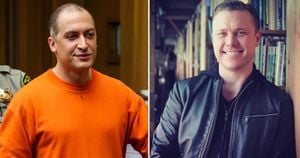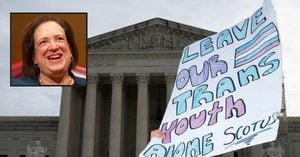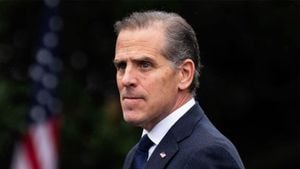Tucker Carlson, the outspoken conservative media figure and former Fox News host, has made headlines once again with his recent return to Moscow, where he interviewed Russian Foreign Minister Sergey Lavrov. Announcing his trip via social media, Carlson emphasized the importance of discussing the geopolitical tensions between the United States and Russia, which he claims are more intense than ever before. "We are closer to nuclear war than at any time in history," he stated, referencing the current global climate, particularly the war in Ukraine.
During the announcement, Carlson was particularly vocal about what he termed the lack of alternative perspectives available to the American public. He argued, "Most Americans have no access to any perspective other than what’s granted to them by NBC News and The New York Times." His desire to interview Lavrov was driven by his belief in the need for American audiences to understand the Russian viewpoint, especially as the conflict continues to escalate.
The backdrop of Carlson's interview is significant. He had previously attempted to secure interviews with Ukrainian President Volodymyr Zelensky, but claims he faced obstacles from the U.S. government. Carlson argued the administration interfered, advising Zelensky, "You can talk to CNN, but you can’t talk to us." This alleged intervention seems to have fueled his determination to highlight the Russian perspective, for which he has now turned to Lavrov.
According to Carlson, the interview with Lavrov addressed pressing concerns, including whether the U.S. and Russia are heading toward "an unprecedented conflict" and the possibility of shifting Russia's alignment away from its partnership with China. Carlson, who is known for his support of Donald Trump, also raised questions about the impact of Trump’s potential return to the presidency on the Ukraine war, seeking Lavrov's insights.
The interview with Lavrov was confirmed by Russian Foreign Ministry spokespeople, who described it as extensive, lasting about one and a half hours. It reportedly covered topics such as the historical ties between Russia and the U.S. and future geopolitical possibilities. Maria Zakharova, the Foreign Ministry spokesperson, noted, "The emphasis was placed on the modern, current history of our difficult relations with the United States, the impact of all this on world geopolitics, the possibilities of future state of affairs," as reported by various news outlets.
Carlson expressed concern over the Biden administration's role, stating it has exacerbated tensions. He criticized decisions enabling Ukraine to attack Russian territory with U.S.-made missiles, characterizing the situation as indicative of America being involved in "a hot war with Russia." This rhetoric has sparked conversations about the potential for escalated military engagement and its dire consequences.
Adding to his claims, Carlson articulated the dire consequences of the current military engagements, asserting, "The fact is, the U.S. military is killing Russians in Russia right now." This assertion, which mirrors conventional Kremlin messaging, has been met with scrutiny as Carlson has yet to provide substantial evidence of direct U.S. military involvement on Russian soil.
His latest endeavor follows his controversial February visit, during which he interviewed President Vladimir Putin. That exchange received significant backlash for its perceived softness; Carlson did not challenge Putin aggressively, leading to public ridicule, including from the Russian president, who poked fun at his lack of probing questions. Carlson’s pattern of seeking out high-profile interviews through what critics describe as sympathetic lenses has placed him at the heart of fiercely discussed media narratives.
Carlson claimed his interviews seek to provoke dialogue and reflection concerning U.S. foreign policy. By engaging directly with figures like Lavrov, he aims to illuminate what he deems overlooked narratives, ostensibly hoping to prompt policy discourse back home.
Despite the criticisms surrounding his journalistic approach, his interviews continue to create buzz, transcending traditional partisan lines. Carlson's return to Moscow demonstrates his intention to remain relevant and maintain his influence within right-leaning media circles.
While the full content of Carlson's discussion with Lavrov is yet to be released, he has hinted it contains poignant insights and controversial discussions surrounding the state of U.S.-Russia relations and the broader international community. He teases the interview's release as "very soon," prompting anticipation among his viewers as they await his framing of Lavrov’s responses.
Carlson’s dual journeys to Russia spotlight significant anxiety surrounding the global power dynamic, drawing attention to the stakes at play as international relations grow fraught with uncertainty. With the interview content set to air shortly, many are curious to see how Carlson will interpret and present Lavrov’s perspectives, especially at such a volatile moment for U.S.-Russia relations.
This latest visit serves as more than just another interview—it's part of Carlson's broader narrative, framed by his belief in the importance of challenging mainstream media interpretations. This endeavor reflects both his commitment to his constituents who seek alternative narratives and his controversial yet strategic positioning within contemporary journalism.



